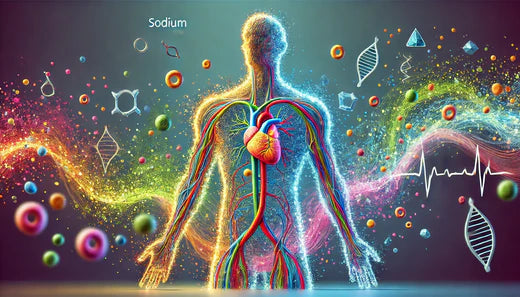What Are Electrolytes? Discover Their Impact on Health

Have you ever wondered what electrolytes are and why they're constantly touted as crucial for your health?
Consider your body a sophisticated machine, with electrolytes as the oil that keeps the engine operating correctly.
Electrolytes are essential for various functions, including heart rate regulation and the ability of your muscles to contract for movement.
In this article, we'll dive deep into electrolytes, explore their impact on health, and how you can manage their levels to boost your overall well-being.
Introduction to Electrolytes and Their Essential Roles
Electrolytes are minerals that carry an electric charge in your blood and other bodily fluids; they are not just a fancy term for your favorite sports drink (1).
Electrolytes are necessary for life because they aid in maintaining equilibrium in your body's water balance, acid/base (pH) balance, and the movement of waste products out of and into your cells.
Ensure that your nerves, muscles, heart, and brain work as they should.
What Are Electrolytes?
Electrolytes are the spark plugs of life, minerals that carry an electric charge. Found in blood, urine, tissues, and other body fluids, they are essential for basic life functions.
Key Types of Electrolytes and Their Sources
Common electrolytes include sodium, potassium, calcium, bicarbonate, magnesium, chloride, and phosphate (2).
These electrolytes are found in various foods and drinks, from the banana in your breakfast smoothie to the spinach in your salad.
How Electrolytes Drive Crucial Bodily Processes
Electrolytes aid in the body's electrical signal transmission, which is required for nerve and muscle signal.
Imagine them as the body's messengers, telling your heart to beat, lungs to breathe, and muscles to move (3).

Top Foods Rich in Electrolytes
Bananas, dairy products, coconut water, whole grains, seeds, nuts, and leafy greens are good sources of electrolytes.
Integrating these into your diet can help you maintain optimal levels naturally.
How Diet Influences Electrolyte Levels
What you eat significantly impacts your electrolyte levels.
A balanced diet of fruits, vegetables, and whole grains ensures you get these vital minerals.
Electrolytes and Fluid Balance: Why It Matters
The balance of electrolytes in our bodies determines how much water is retained or released.
This balance is crucial for maintaining blood pressure, hydration, and overall health (4).

Recognizing the Signs of Electrolyte Imbalance
Symptoms of an imbalance include muscle aches, cramping, fatigue, and more. Knowing these can help you respond quickly to prevent serious health issues (5).
Electrolytes Blood Test: Interpreting Normal Ranges
A simple blood test can reveal your electrolyte levels, often included in routine health screenings.
Being aware of these facts will enable you to maintain your heart.
Final Thoughts
A body with balanced electrolytes functions optimally, similar to a well-oiled machine.
Understanding electrolytes and their crucial roles, you can proactively maintain this balance with a diet rich in natural, wholesome foods, reflecting Wild Foods' commitment to natural health.
Let your body thrive naturally, and remember, the path to wellness is through nature.
💪 Empower Your Health! Achieve optimal hydration and performance with Wild Foods Himalayan Salt
FAQs
What do electrolytes do for the boy?
They help repair damaged tissue, manage blood pressure and acidity, hydrate the body, and control nerve and muscle function.
What are examples of electrolytes?
Sodium, potassium, chloride, calcium, and magnesium.
What foods are high in electrolytes?
Spinach, turkey, potatoes, oranges, and yogurt are excellent sources.
Does drinking water increase electrolytes?
Plain water does not contain electrolytes, but it's essential for transporting electrolytes through the body.
Are bananas high in electrolytes?
Yes, bananas are particularly rich in potassium.
Related Studies
1. Title: General characteristics of patients with electrolyte imbalance admitted to emergency department
A comprehensive review by the National Institutes of Health (NIH) titled "Electrolytes - Diet and Health" highlights the importance of electrolytes in maintaining fluid balance, regulating nerve and muscle function, and supporting cardiovascular health.
Link: https://www.ncbi.nlm.nih.gov/pmc/articles/PMC4129840/
2. Title: Diet and Health: Implications for Reducing Chronic Disease Risk
A study published in the Journal of the American College of Nutrition found that fruits and vegetables are the primary dietary sources of electrolytes like potassium, magnesium, and calcium. At the same time, processed foods are high in sodium.
Link: https://www.ncbi.nlm.nih.gov/books/NBK218740/
3. Title: Electrolyte Panel
Research from the Journal of the American Society of Nephrology demonstrates that electrolytes, particularly sodium, potassium, and calcium, play a crucial role in generating and transmitting electrical signals in nerves and muscles, enabling proper muscle contraction and nerve impulse propagation.
Link: https://medlineplus.gov/lab-tests/electrolyte-panel/
4. Title: Influence of Hydration and Electrolyte Supplementation on Incidence and Time to Onset of Exercise-Associated Muscle Cramps
A study in the Clinical Journal of Sport Medicine found that maintaining electrolyte balance, especially sodium and potassium levels, is essential for proper fluid regulation and hydration status, as electrolytes help distribute fluids throughout the body.
Link: https://www.ncbi.nlm.nih.gov/pmc/articles/PMC1150229/
5. Title: The Beverage Hydration Index: Influence of Electrolytes, Carbohydrate and Protein
A study published in the Emergency Medicine Journal identified common symptoms of electrolyte imbalances, including muscle cramps, fatigue, confusion, irregular heartbeat, and nausea.
Link: https://www.ncbi.nlm.nih.gov/pmc/articles/PMC8465972/

